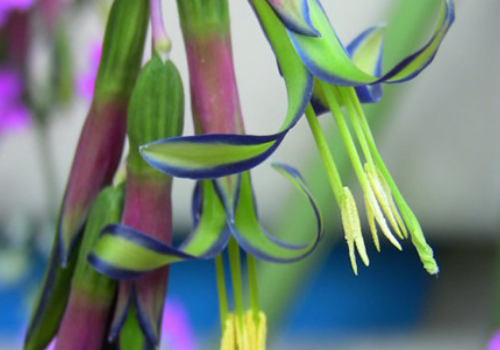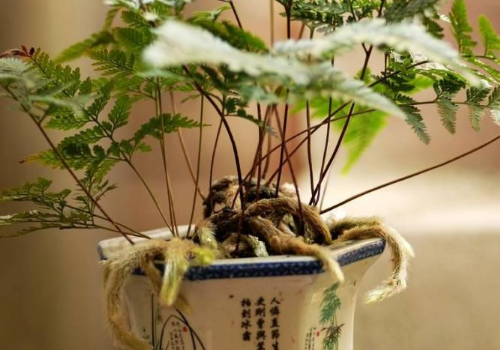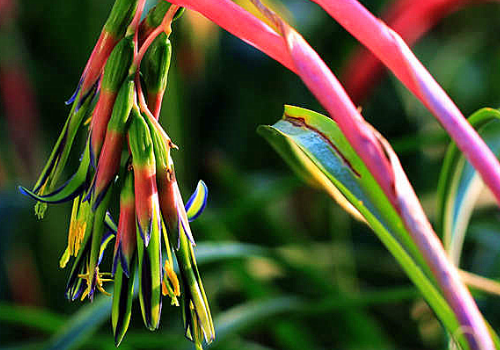How to raise the rootstock of the water tower flower? what to do if it is rotten?
The emerald green leaves of the water tower flower are also very beautiful. How to raise the water tower flower? What if the rhizome is rotten:
How to raise the flowers in the water tower:
Chuanhua water tower flowers like warm, humid, sunny environment, only in bright light conditions, can blossom normally and get the most beautiful leaves, but still need to prevent the direct sunlight at noon in summer. The suitable growth temperature is 20-30 ℃ in summer and 15-18 ℃ in winter. It is difficult to grow when it is lower than 10 ℃, and the lowest growth temperature is 5 ℃ at night. The flowering water tower flower is more hardy and can withstand 2 ℃ low temperature for a short time. The soil is mixed with rotten leaf soil or peat soil with neutral or slightly acidic sandy loam.

What if the roots and stems of the water tower are rotten:
In fact, the root rot of the water tower flower is caused by too much watering, especially in winter, when the low temperature and stagnant water are very easy to cause the root rot of the flower.
Therefore, when watering the flowers of the Chuanhua water tower, we must be careful not to have stagnant water, and pay attention to maintaining the appropriate temperature in winter. In this way, the rootstock rot of the water tower flower can be avoided.
Do you know the culture method of the flower in the water tower?
Billbergia nutans Water Tower Flower introduction: how to raise Water Tower Flower / how to reproduce Water Tower Flower Business Card Billbergia nutans Water Tower Flower Culture methods and matters needing attention introduction of pendent water tower flower native to South America. The leaf is sword-shaped, hard and denticulate. Inflorescences slender, spikes, with several large rose-red bracts. It is cold-resistant and can withstand 2 ℃ low temperature for a short time. Generally, plants that have been cultivated for 3 years or whose ball diameter is more than 8 cm can blossom and bear fruit. It can collect seeds, sow and propagate, the emergence rate is high, the young stage management is easy, and it is suitable for potted ornamental plants. The water tower flower of the pineapple family is a perennial evergreen herbaceous plant, which is a small pineapple and often grows in clusters. The plant is rosette-shaped and consists of 12-15 leaves. The morphological characteristics of the water tower flower the stem of the water tower flower is very short. Leaves rosette, up to 50 cm long and 15 mm wide, apex pendulous, leaf margin sparsely spiny; scape 30 cm long, apex pendulous, with 4-12 flowers, glabrous, inflorescence rachis geniculate; involucral bracts narrow, close to scape, pink to light red Calyx 3, 1.3-2.7 cm long, orange-red, margin blue-purple, petals 3, 3.6-4 cm long, green, margin blue-purple, apex acute, reflexed; stamens 6; anthers 7 mm long, protruding out of flower; ovary inferior, green, 1 cm long, placenta axile, stigma twisted. The seeds are mostly small. Greenhouse in our country is often cultivated for ornamental use. Originally from Brazil. The water tower flower of the pineapple family is a perennial evergreen herb of the pineapple family. It is a small pineapple and often grows in clusters. The plant is rosette-shaped and consists of 12-15 leaves. Leaves sword-shaped or narrowly lanceolate, hard, dark green, abaxially covered with white scales, covered with powder, margin serrated. Spring flowering, scape drawn from the leaves, spikes arched drooping, ca. 30 cm long, bracts rose-red, Corolla yellowish green, margin blue. The ecological habit of Chuanhua is cold-resistant and can withstand the low temperature of 2 ℃ for a short time. The cultivation techniques of water tower flower (1) temperature: like warm climate, the suitable temperature for growth is 21-27 °. In ornamental pineapple, it belongs to the species with strong adaptability to temperature and can withstand the low temperature of 2-5 °. It is possible to spend the winter in the open field in South China, but in the north area, it is necessary to move indoors to keep warm when overwintering, and to cover the plants with plastic bags when the cold current strikes to prevent the occurrence of cold injury. In the hot summer, ventilation should be strengthened to get rid of the muggy heat. (2) Illumination: like semi-overcast, avoid strong sunlight exposure. When the light is too strong, the leaves will turn yellow or even burn and appear scorched spots. From May to September, the ship will shade, cover 50% ~ 70% of the light, or place places with plenty of light. Plenty of sunshine is needed for the rest of the time. (3) watering: like wet soil conditions, too dry basin soil will make the leaf tip scorched, and the plant growth is poor. Adequate water supply should be provided during the growth period to keep the basin soil moist, but avoid excessive wetness and stagnant water, so as to avoid rotting roots. (4) Environmental humidity: like to grow in the environment where the air relative humidity is very high, and the air relative humidity had better be maintained at 85 /. Above. When the air relative humidity is high, the plant will show a bright and oily luster. When the air is dry, the plants become dark and dull, and the leaves are thin and lifeless. During the growth period, especially when the air is dry, you should often spray water to the surrounding environment to make the air moist. When the temperature is low in winter, plastic bags can be put on the pot plants, which can not only keep warm, but also maintain suitable air relative humidity, which is beneficial to the growth of plants. (5) fertilization: topdressing the combination of phosphorus and potassium fertilizer twice before blooming in spring. After flowering, the requirement of fertilizer is not high, generally there is no need to apply fertilizer, only when the plant grows thin due to lack of fertilizer, nitrogen-based fertilizer should be applied properly. Stop fertilizing in winter. (6) pruning: after the flower fades, the flower branches should be cut off in time to facilitate the plant to germinate new buds. (7) turning the basin: when the basin is not turned for many years, the plant is not easy to sprout, and the plant cluster is easy to aging, and the growth potential becomes worse. The basin should be turned once every 1-2 years, and it should be done after flowering. The matrix can be prepared with 1 part of peat soil, 1 part of vermiculite, 0.5 part of perlite, or 1 part of peat soil and 1 part of tree fern. In general, there are few diseases and insect pests in the prevention and control of diseases and insect pests. Only when the air is relatively humid and unventilated, it is easy to breed red butterfly spiders and shell insects. Frequently asked questions about planting and raising 1. The leaf tip is scorched: the ① air is too dry; the ② is underwatered, which makes the basin soil too dry. two。 Root rot or stem rot: often caused by too much watering, especially when it is low and wet in winter. The way of propagation, ramet and sowing. (1) ramet: after the plant blossoms, the tufted plants are divided into several clusters with a sharp knife. The new plants should not be small, with at least two mother plants in each clump and one or two daughter plants. The new plant is small and can survive, but the shape of the plant is not beautiful. After cutting, smear sulfur powder or plant ash on the wound, and then put on the basin respectively. The new plant can blossom in the second year after planting. (2) sowing: immediately after the fruit is ripe, after removing the pericarp and washing, sow the seeds in the substrate, pour enough water, cover the basin with glass or plastic bags, maintain the temperature above 20 °, usually germinate after 1-2 weeks. Sowing seedlings need to be cultivated for 3 years before they can blossom, so use less. The garden use of the water tower flowers the leaves of the water tower flowers are like orchids, and they are colorful and beautiful when they bloom. Not only can watch the leaves, but also can watch the flowers, and strong nature, easy to grow and raise, suitable for family cultivation. The function, ornamental and health care function of the water tower flower is a plant of acid metabolism (CAM), which should be placed in the bedroom or study to keep the indoor air fresh. How long does it take for the water tower to bloom?
In general, the water tower flower needs to be cultured for about 3 years or when its bulb is longer than 8cm before it will blossom and bear fruit. The time of flowering is usually in spring. In spring, the flowers of the water tower flower will slowly open, the scape will come out, and the spike-like inflorescence will grow, and the color is very bright.
Water tower flowers like a warm and humid growing environment, need to keep the soil and water moist, but not too humid. And in the maintenance process must avoid strong light, can be placed in the living room, courtyard and other places, beautiful living environment.
That's all for today. I hope the content of this article can help you raise your own water tower flowers.
- Prev

Can Wolftail fern be put in the indoor bedroom? can it be hydroponically cultured?
The market price of wolftail fern is not as expensive as other plants, and it is still very close to the people. Can Wolftail fern be put in the indoor bedroom? Can it be hydroponically cultured: can Wolftail fern be put in the indoor bedroom? it will do no harm to the human body. Wolftail fern can be placed next to coffee tables and printers.
- Next

Is the flower in the water tower poisonous? matters needing attention in culture
The culture method of water tower flower is still very simple. Is the flower of the water tower poisonous? Breeding precautions: is the water tower flower poisonous: the water tower flower should be non-toxic, because there is no clear data to prove that the flower is poisonous or non-toxic.
Related
- Fuxing push coffee new agricultural production and marketing class: lack of small-scale processing plants
- Jujube rice field leisure farm deep ploughing Yilan for five years to create a space for organic food and play
- Nongyu Farm-A trial of organic papaya for brave women with advanced technology
- Four points for attention in the prevention and control of diseases and insect pests of edible fungi
- How to add nutrient solution to Edible Fungi
- Is there any good way to control edible fungus mites?
- Open Inoculation Technology of Edible Fungi
- Is there any clever way to use fertilizer for edible fungus in winter?
- What agents are used to kill the pathogens of edible fungi in the mushroom shed?
- Rapid drying of Edible Fungi

